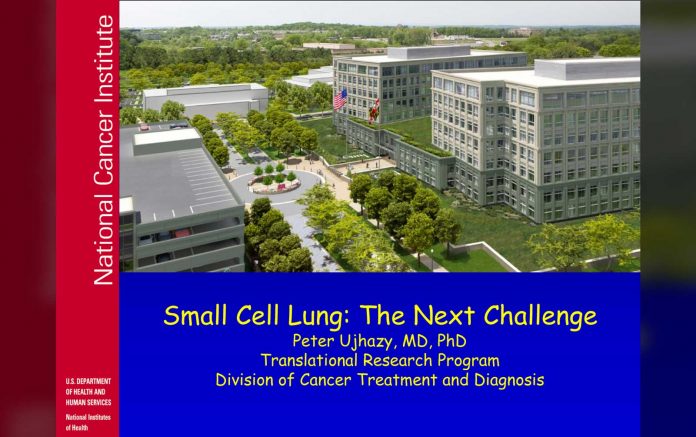By Peter Ujhazy, MD, PhD
The newfound optimism in the management of lung cancer that infused the research, clinical, and patient communities 12 years ago is still gaining momentum. Seminal findings on the predictive value of epidermal growth factor receptor mutations1,2 were followed by discoveries of other therapeutic targets (ALK, ROS1, BRAF, etc.) and by the development of clinically applicable agents. These ultimately resulted in significant increases in the overall survival for thousands of patients. More recently, breakthroughs in our understanding of the immune responses to cancer have led to interventions using checkpoint inhibitors that, at least in some patients, have secured long-term remissions. Combinations of these approaches with chemo- and radiation therapy should slowly but steadily improve the 5-year survival rates of our patients. The beneficiaries of these milestones are mostly patients diagnosed with non-small cell lung cancer.
Another Wave of Optimism: Small Cell Lung Cancer
Today, we are witnessing another wave of optimism, this time regarding the “orphan” in the family of lung cancers: small cell lung cancer (SCLC). A major clinical challenge for many decades, SCLC is finally receiving the attention it deserves. Reasons for the slow progress in SCLC research are many: short lifespan of patients after diagnosis; limited access to specimens leading to (still) limited genomic, epigenomic, proteomic, and metabolomics data; incomplete information on the biology of premalignant lesions and the disease itself; and the mysterious development of irreversible treatment resistance after a remarkably successful short-term response to first-line chemotherapy. However, during the last 5 years several landmarks were achieved in the genomic and proteomic characterization of the disease. 3 New precision medicine interventions such as targeting the DLL3 protein4 or immunotherapy with checkpoint inhibitors5 have opened the doors to a new era in the management of SCLC.
Strategic Opportunities in SCLC Research
In 2013, the US Congress through the Recalcitrant Cancer Research Bill mandated the NCI to develop a scientific framework to conduct and support research on SCLC. That same year, the NCI, then under the leadership of its director and a lung cancer scientist Dr. Harold Varmus, held a workshop with national and international experts to establish the major strategic opportunities in SCLC research. They were summarized in the following five points:
1. Creation of Better Research Tools for the Study of SCLC
2. Comprehensive Genomic Profiling
3. New Diagnostic Approaches
4. Therapeutic Development Efforts
5. Mechanisms Underlying Both High Rate of Initial Response and Rapid Emergence of Drug and Radiation Resistance
Scientific Framework for SCLC
The NCI followed with a Scientific Framework for SCLC report6 that delineates the implementation of programs targeting these five points. The IASLC played a critical role in these efforts by organizing a follow-up meeting in spring of 2015, in collaboration with the NCI, with the participation of 200 world experts in the disease. Finally, last year, the NCI released a series of three Program Announcements soliciting proposals in SCLC research addressing all five areas (PAR-16-049, PAR-16-050, and PAR-16-051).
The intent is to create an NCI SCLC Consortium with multiple projects focused on early detection, prevention, and treatment. There will be a coordinating center that will serve as the hub for biospecimen collection, virtual tissue banking, model development and distribution, biostatistical analysis, bioinformatics including genomic, proteomic, and metabolomics databases, and administration. The Consortium will take advantage of NCI resources including the collection of oncology agents, various research models such as patient-derived xenografts, DNA/RNA pellets, but also semantic services, metadata, and terminology support.
The Program Announcements are currently open for applications, and the first round signals a strong national and international interest in SCLC projects. The NCI will continue in its fruitful collaboration with the IASLC to organize biennial meetings in the rapidly evolving field of SCLC research.
References
1. Lynch TJ, Bell DW, Sordella R, et al. Activating mutations in the epidermal growth factor receptor underlying responsiveness of non-small-cell lung cancer to gefitinib. N Engl J Med. 2004;350:2129-2139.
2. Paez JG, Janne PA, Lee JC, et al. EGFR mutations in lung cancer: Correlation with clinical response to gefitinib therapy. Science. 2004;304:1497-1500.
3. Bunn PA, Jr, Minna JD, Augustyn A, et al. Small Cell Lung Cancer: Can Recent Advances in Biology and Molecular Biology Be Translated into Improved Outcomes? J Thorac Oncol. 2016;11:453-474.
4. Saunders LR, Bankovich AJ, Anderson WC, et al. A DLL3- targeted antibody-drug conjugate eradicates high-grade pulmonary neuroendocrine tumor-initiating cells in vivo. Sci Transl Med. 2015;7:302ra136.
5. Reck M, Heigener D, Reinmuth N. Immunotherapy for small-cell lung cancer: Emerging evidence. Future Oncol. 2016;12:931-943.
6. Scientific Framework for Small Cell Lung Cancer (SCLC). (National Cancer Institute, National Cancer Institute, 2014).











